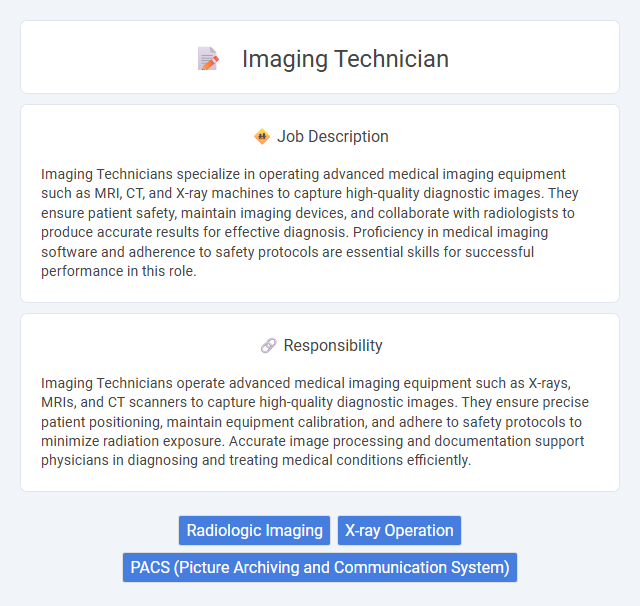
Imaging Technicians specialize in operating advanced medical imaging equipment such as MRI, CT, and X-ray machines to capture high-quality diagnostic images. They ensure patient safety, maintain imaging devices, and collaborate with radiologists to produce accurate results for effective diagnosis. Proficiency in medical imaging software and adherence to safety protocols are essential skills for successful performance in this role.
Individuals with strong attention to detail and steady hands are likely suitable for an Imaging Technician role, as the job demands precision in operating diagnostic equipment. Those who are comfortable working in clinical environments and handling potentially ill or anxious patients may adapt well to the conditions. Candidates with good interpersonal skills and the ability to follow strict safety protocols probably have a higher chance of thriving in this position.
Qualification
Imaging Technicians typically require an associate degree in radiologic technology or a related field, along with certification from the American Registry of Radiologic Technologists (ARRT) or equivalent. Proficiency in operating imaging equipment such as X-rays, MRIs, and CT scanners is essential, as well as knowledge of radiation safety protocols. Strong technical skills combined with attention to detail ensure accurate image capture for proper diagnosis and treatment planning.
Responsibility
Imaging Technicians operate advanced medical imaging equipment such as X-rays, MRIs, and CT scanners to capture high-quality diagnostic images. They ensure precise patient positioning, maintain equipment calibration, and adhere to safety protocols to minimize radiation exposure. Accurate image processing and documentation support physicians in diagnosing and treating medical conditions efficiently.
Benefit
Imaging Technician roles likely offer benefits such as competitive salaries and access to advanced medical imaging technology, enhancing professional skills. Employees probably receive health insurance, retirement plans, and paid time off, contributing to overall job satisfaction and security. Opportunities for continuing education and certification might also be available, supporting career growth and expertise in the field.
Challenge
Imaging Technician roles likely involve handling advanced diagnostic equipment, presenting a challenge in mastering complex technology. There is a probability that troubleshooting imaging machinery and maintaining image quality under tight schedules demands both precision and adaptability. The role may also require balancing technical skills with patient interaction, adding to the job's multifaceted challenges.
Career Advancement
Imaging Technicians play a critical role in medical diagnostics by operating advanced imaging equipment such as MRI, CT, and X-ray machines, contributing to accurate patient assessments. Career advancement opportunities include specialization in modalities like sonography or radiography, leading to roles such as Radiologic Technologist or Diagnostic Medical Sonographer. Pursuing certifications from organizations like the American Registry of Radiologic Technologists (ARRT) enhances job prospects and supports progression to supervisory or managerial positions within healthcare facilities.
Key Terms
Radiologic Imaging
Radiologic Imaging Technicians specialize in operating advanced imaging equipment such as X-ray, MRI, and CT scanners to capture detailed internal body images for accurate diagnosis. Proficiency in radiation safety protocols and patient positioning ensures high-quality images while minimizing exposure. Expertise in digital imaging systems and knowledge of anatomy are essential for effective collaboration with radiologists and healthcare teams.
X-ray Operation
Imaging technicians specializing in X-ray operation expertly manage radiographic equipment to capture high-quality diagnostic images while ensuring patient safety through precise positioning and radiation exposure control. Proficiency in digital radiography systems and adherence to regulatory standards such as HIPAA and FDA guidelines are critical for accurate image acquisition and data handling. Collaboration with radiologists and healthcare teams facilitates the interpretation of images, contributing to effective diagnosis and treatment planning.
PACS (Picture Archiving and Communication System)
An Imaging Technician specializing in PACS manages digital medical images, ensuring efficient storage, retrieval, and distribution within healthcare networks. Expertise in PACS software allows for seamless integration with modalities like MRI, CT, and X-ray, improving diagnostic workflows and patient care. Maintenance of PACS hardware and troubleshooting system errors are critical for minimizing downtime and optimizing image quality access.
 kuljobs.com
kuljobs.com